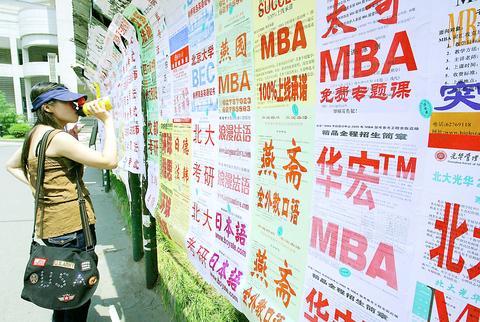Fifteen years after troops backed by tanks crushed China's democracy movement centered on Beijing's Tiananmen Square, some survivors and families of the dead are still seeking redress.
For Ding Zilin (

PHOTO: AFP
"Today, as we face those names so familiar to us, our hearts continue to tremble and bleed," she wrote on behalf of the Tiananmen Mothers advocacy group in a letter sent to reporters in Beijing. "We should remember that the system we live in is full of barbarism, inhumanity and hypocrisy.
"It remains a system in which freedom and democracy are smothered, in which any sparks of civilization must be extinguished, and in which any who challenge this system must be ruthlessly suppressed," she wrote.
The mothers demanded that China's current leadership, led by President Hu Jintao (胡錦濤) and Premier Wen Jiabao (溫家寶), who are keen to burnish their "men of the people" image, recognize the military suppression as a crime against humanity.
"[They need] the kind of courage that can face the crimes of history with true repentance," wrote Ding, who rights groups say is under house arrest to prevent her from meeting journalists or publicly commemorating the June 4 anniversary.
Hu replaced Jiang Zemin (
The Tiananmen Mothers recorded the names of 182 people killed during the massacre, including Cheng Renxing (程仁興), who fell at the base of a flagpole flying the Chinese flag at the center of the square, and Wu Guofeng (吳國鋒), who appeared to die from bayonet wounds.
In March, Wen ruled out an appraisal of the 1989 protests, citing the need for unity and stability.
But authorities have changed their description of the protest from a "counter-revolutionary rebellion" to a "political disturbance," ostensibly playing down its significance in the hope that people would forget about it.
Witnesses and rights groups say hundreds, if not thousands, of people died during the crackdown. Some died on the streets giving first aid to the injured. Most victims are unaccounted for because their families fear repercussions if they come forward.
Many were killed at intersections such as the Muxidi Bridge in western Beijing, where ordinary citizens gathered to block tanks from rolling into the city center, they said.
For Bao Tong (
"It even should have been possible to seize the opportunity to expand political reform, which aimed at greater democracy," Bao wrote in a commentary, a copy of which was made available to foreign media.
Instead, human rights violations and curbs on press freedom had only worsened, he said.
"The party seems to have put itself back in charge of judging and making arrests in political cases, and in charge of media and publishing, all to support its policy of `stability above all,'" wrote Bao, who has been under tight surveillance since his release from prison in 1996.
Analysts said a reassessment of the protests was next to impossible in the near future because leaders who were either involved in or benefited from the crackdown are still alive.
Journalist Dai Qing (
"Back in those days, Wang Dan (王丹) would never choose to do small things. But I don't think that just because it's small, it's not worth doing," she said.

VAGUE: The criteria of the amnesty remain unclear, but it would cover political violence from 1999 to today, and those convicted of murder or drug trafficking would not qualify Venezuelan Acting President Delcy Rodriguez on Friday announced an amnesty bill that could lead to the release of hundreds of prisoners, including opposition leaders, journalists and human rights activists detained for political reasons. The measure had long been sought by the US-backed opposition. It is the latest concession Rodriguez has made since taking the reins of the country on Jan. 3 after the brazen seizure of then-Venezuelan president Nicolas Maduro. Rodriguez told a gathering of justices, magistrates, ministers, military brass and other government leaders that the ruling party-controlled Venezuelan National Assembly would take up the bill with urgency. Rodriguez also announced the shutdown

Civil society leaders and members of a left-wing coalition yesterday filed impeachment complaints against Philippine Vice President Sara Duterte, restarting a process sidelined by the Supreme Court last year. Both cases accuse Duterte of misusing public funds during her term as education secretary, while one revives allegations that she threatened to assassinate former ally Philippine President Ferdinand Marcos Jr. The filings come on the same day that a committee in the House of Representatives was to begin hearings into impeachment complaints against Marcos, accused of corruption tied to a spiraling scandal over bogus flood control projects. Under the constitution, an impeachment by the

China executed 11 people linked to Myanmar criminal gangs, including “key members” of telecom scam operations, state media reported yesterday, as Beijing toughens its response to the sprawling, transnational industry. Fraud compounds where scammers lure Internet users into fake romantic relationships and cryptocurrency investments have flourished across Southeast Asia, including in Myanmar. Initially largely targeting Chinese speakers, the criminal groups behind the compounds have expanded operations into multiple languages to steal from victims around the world. Those conducting the scams are sometimes willing con artists, and other times trafficked foreign nationals forced to work. In the past few years, Beijing has stepped up cooperation

Exiled Tibetans began a unique global election yesterday for a government representing a homeland many have never seen, as part of a democratic exercise voters say carries great weight. From red-robed Buddhist monks in the snowy Himalayas, to political exiles in megacities across South Asia, to refugees in Australia, Europe and North America, voting takes place in 27 countries — but not China. “Elections ... show that the struggle for Tibet’s freedom and independence continues from generation to generation,” said candidate Gyaltsen Chokye, 33, who is based in the Indian hill-town of Dharamsala, headquarters of the government-in-exile, the Central Tibetan Administration (CTA). It